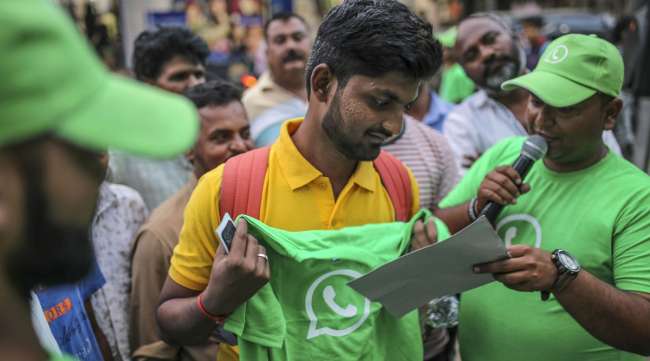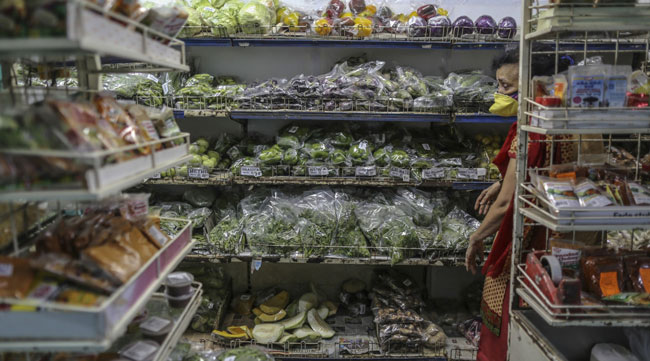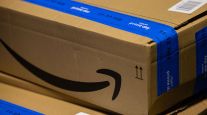Facebook’s $6 Billion India Bet Kindles E-Commerce War With Amazon, Walmart

[Stay on top of transportation news: Get TTNews in your inbox.]
Facebook Inc.’s $5.7 billion investment in a unit of India’s Reliance Industries Ltd. creates an e-commerce leviathan to take on Amazon.com and Walmart Inc. in one of the world’s most competitive internet arenas.
The deal twins WhatsApp with Reliance’s nearly 400 million internet users — much of that added in just a couple of years — and nationwide store and logistics network. The pair could start with forays into e-commerce and digital payments, before moving on to segments from online education to virtual health over the longer term, helping transform the industry that’s now mainly the preserve of India’s urban elite.
Facebook’s biggest investment since its takeover of WhatsApp could empower a new combatant in an e-commerce war already raging between Amazon and Walmart’s Flipkart. On April 22, Facebook founder Mark Zuckerberg and Reliance Chairman Mukesh Ambani singled out the retail sphere as an area ripe for collaboration. While they were vague on details, Whatsapp and Reliance’s JioMart could start by delivering products through kiranas, the mom-and-pop stores that dominate commerce across the nation, they said.

Much of the trucking industry relies on older onboard technology for critical functions, which can hurt reliability and efficiency. So is it time for fleets and their technology vendors to implement faster replacement cycles for onboard tech? Seth Clevenger talks to Ray Greer of Omnitracs and Deryk Powell of Velociti. Hear a snippet, above, and get the full program by going to RoadSigns.TTNews.com.
“We’re also committing to work together on some critical projects that we think are going to open up a lot of opportunities for commerce in India,” Zuckerberg said in a video posted on his social media platform. “With a lot of communities around the world in lockdown, it’s even more important now than ever that people have the tools to connect with each other and that businesses can find ways to operate online.”
India, the last big global retail frontier with 1.3 billion people, is an open arena for technology giants as smartphone adoption balloons and cut-rate data plans fuel consumer entertainment and social media. That will prompt more Indians to shop over the internet. Currently, about 140 million buy products online at least once in 12 months, according to Forrester Research.
Amazon, which has invested more than $6.5 billion in India, and Walmart, which acquired Flipkart in a $16 billion deal two years ago, are betting the switch to e-commerce will accelerate, and are using local kiranas to extend their reach into rural India.
Amazon founder Jeff Bezos, during a trip to India in January, said his company plans to invest $1 billion to help digitize small and medium businesses including kiranas. The company also has invested in offline assets, buying stakes in retailers such as Shoppers Stop Ltd. and Future Group.
Indians can order goods and get faster shipments from local stores, and those stores can in turn grow their business, Ambani, who regained his position as Asia’s richest person after the deal, said in a separate video.
“In the very near future, JioMart, Jio’s digital new commerce platform, and WhatsApp will empower nearly 3 crore [30 million] small Indian kirana shops to digitally transact with every customer in their neighborhood,” he said.
India’s $800 billion retail market is dominated by groceries and everyday essentials, which account for about $500 billion in annual sales. The market could grow at least 10% annually to $1.3 trillion by 2025.

A customer wearing a protective mask shops for vegetables at a store in Mumbai, India, on April 5. (Dhiraj Singh/Bloomberg News)
Most Indians buy their daily supplies through kiranas: tiny mom and pop stores stacked with products ranging from shaving razors to onions and instant noodles. Organized retail such as supermarket chains command a minuscule share of the market because kiranas enjoy the trust and loyalty of local communities.
“It’s a double-sided coup,” said Arvind Singhal, chairman of Gurgaon, India-based retail consultancy Technopak Advisors. “Reliance has mammoth retail infrastructure, including a chain of 11,000 stores, wholesale relationships, warehousing and a vast portfolio of private labels while Facebook’s WhatsApp will be the platform where users could ease into online retail and even make digital payments.”
But testing grocery retail is only the first step. WhatsApp is now preparing to roll out a nationwide payments network, entering a market estimated to expand to $1 trillion by 2023, according to Credit Suisse Group AG.
“If the Jio deal works, Facebook can take it to other markets and compete with Amazon and Walmart in global e-commerce,” said Satish Meena, a senior analyst with Forrester Research
The combination should get off the ground quickly as kirana owners and their users already have WhatsApp installed on phones, Meena said.
“The deal signals that Facebook’s long-held dream of getting into e-commerce will get realized,” he said. “They have been forever trying to go from advertising into e-commerce and payments.”
In his video, Ambani hinted at the vast future scope of the collaboration.
“In the days to come, this winning recipe will be extended to serve other key segments like kisans [farmers], small and medium enterprises, students and teachers, health care providers, women and youth,” he said. WhatsApp has seeped into the daily vocabulary of Indians and become a friend to everybody, he said. “Together, we will accelerate India’s digital economy.”
Want more news? Listen to today's daily briefing:




